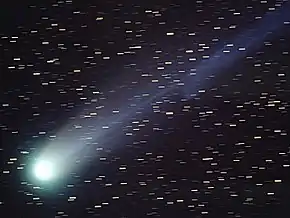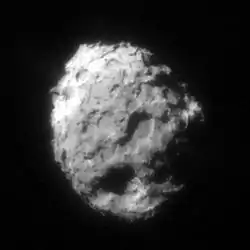10P/Tempel
10P/Tempel, also known as Tempel 2, is a periodic Jupiter-family comet with a 5 year orbital period. It was discovered on July 4, 1873 by Wilhelm Tempel.[7] The next perihelion passage is 24 March 2021 when the comet will have a solar elongation of 30 degrees at approximately apparent magnitude 11.[4] Closest approach to Earth during the 2021 passage will not occur until many months later on 3 November 2021 at a distance of 1.6 AU (240 million km).[8]
| Discovery | |
|---|---|
| Discovered by | Ernst Wilhelm Leberecht Tempel[1] |
| Discovery date | July 4, 1873 |
| Alternative designations | 1873 II; 1878 III; 1894 III; 1899 IV; 1904 III; 1915 I; 1920 II; 1925 IV; 1930 VII; 1946 III; 1951 VIII; 1957 II; 1962 VI; 1967 X; 1972 X; 1978 V; 1983 X; 1988 XIV; 1994 VII; |
| Orbital characteristics A | |
| Epoch | December 4, 2015 (JD 2457360.5) |
| Aphelion | 4.711 AU |
| Perihelion | 1.4176 AU |
| Semi-major axis | 3.064 AU |
| Eccentricity | 0.53736 |
| Orbital period | 5.36 yr |
| Inclination | 12.028° |
| Earth MOID | 0.41 AU (61 million km) |
| Dimensions | 10.6 km[1] |
| Last perihelion | 14 November 2015[2][3] 4 July 2010[4][5] |
| Next perihelion | 2021-Mar-24[2][6] |
The comet nucleus is estimated to be roughly the size of Halley's Comet at 10.6 kilometers in diameter with a low albedo of 0.022.[1] The nucleus is dark because hydrocarbons on the surface have been converted to a dark, tar like substance by solar ultraviolet radiation. The nucleus is large enough that even near aphelion (furthest distance from the Sun which is near the orbit of Jupiter) the comet remains brighter than about magnitude 21.
During the 2010 apparition the comet brightened to about apparent magnitude 8.[4] The most favorable apparition of 10P/Tempel 2 was in 1925 when it came within 0.35 AU (52 million km; 33 million mi) of Earth with an apparent magnitude of 6.5.[7] On August 3, 2026, comet Tempel 2 will have another close pass within about 0.41 AU (61 million km; 38 million mi) of Earth.[9]
References
- "JPL Small-Body Database Browser: 10P/Tempel 2" (last observation: 2014-03-29; arc: 67.91 years). Jet Propulsion Laboratory. Retrieved 2010-02-24.
- "10P/Tempel Orbit". Minor Planet Center. Retrieved 2014-11-06.
- 10P at Kazuo Kinoshita home page
- Seiichi Yoshida (2008-01-27). "10P/Tempel 2". Seiichi Yoshida's Comet Catalog. Retrieved 2010-02-24.
- Syuichi Nakano (2007-04-10). "10P/Tempel 2 (NK 1460)". OAA Computing and Minor Planet Sections. Retrieved 2010-02-24.
- Horizons output. "Observer Table for 10P/Tempel". Retrieved 2011-07-24. (Observer Location:@sun)
- Kronk, Gary W. "10P/Tempel 2". Archived from the original on 22 February 2010. Retrieved 2010-02-24. (Cometography Home Page)
- JPL Horizons closest approach to Earth
Goto JPL Horizons
Ephemeris Type: Observer
Observer Location: 500 (Geocentric)
(Closest approach occurs when deldot flips from negative to positive) - "JPL Close-Approach Data: 10P/Tempel 2" (last observation: 2014-03-29; arc: 67.91 years). Retrieved 2010-02-24.
External links
- Orbital simulation from JPL (Java) / Horizons Ephemeris
- Elements and Ephemeris for 10P/Tempel – Minor Planet Center
- 10P/Tempel 2 / 2010 – Seiichi Yoshida @ aerith.net
- 10P/Tempel 2 (2010) (astrosurf)
| Numbered comets | ||
|---|---|---|
| Previous 9P/Tempel |
10P/Tempel | Next 11P/Tempel–Swift–LINEAR |




